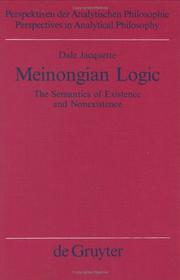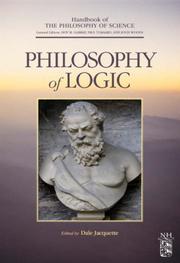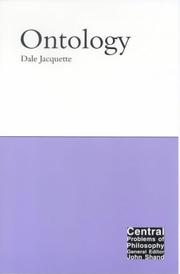| Listing 1 - 10 of 14 | << page >> |
Sort by
|
Book
ISBN: 9783319180755 3319180746 9783319180748 3319180754 Year: 2015 Publisher: Cham : Springer International Publishing : Imprint: Springer,
Abstract | Keywords | Export | Availability | Bookmark
 Loading...
Loading...Choose an application
- Reference Manager
- EndNote
- RefWorks (Direct export to RefWorks)
This book explores the thought of Alexius Meinong, a philosopher known for his unconventional theory of reference and predication. The chapters cover a natural progression of topics, beginning with the origins of Gegenstandstheorie, Meinong’s theory of objects, and his discovery of assumptions as a fourth category of mental states to supplement his teacher Franz Brentano’s references to presentations, feelings, and judgments. The chapters explore further the meaning and metaphysics of fictional and other nonexistent intended objects, fine points in Meinongian object theory are considered and new and previously unanticipated problems are addressed. The author traces being and non-being, and aspects of beingless objects including objects in fiction, ideal objects in scientific theory, objects ostensibly referred to in false science and false history, and intentional imaginative projection of future states of affairs. The chapters focus on an essential choice of conceptual, logical, semantic, ontic and more generally metaphysical problems, and an argument is progressively developed from the first to the final chapter, as key ideas are introduced and refined. Meinong studies have come a long way from Bertrand Russell’s off-target criticisms, and recent times have seen a rise of interest in a Meinongian approach to logic and the theory of meaning. New thinkers see Meinong as a bridge figure between analytic and continental thought, thanks to the need for an adequate semantics of meaning in philosophy of language and philosophy of mind, making this book a particularly timely publication.
Philosophy. --- History of Philosophy. --- Metaphysics. --- Ontology. --- Phenomenology. --- Philosophy of Mind. --- Philosophy (General). --- Philosophy of mind. --- Métaphysique --- Ontologie --- Phénoménologie --- Philosophie de l'esprit --- Meinong, A. -- (Alexius), -- 1853-1920. --- Philosophy & Religion --- Philosophy --- Meinong, A. --- Meinong, Alexius, --- Meinong, --- God --- Ontology --- Philosophy of mind --- Phenomenology . --- Mind, Philosophy of --- Mind, Theory of --- Theory of mind --- Cognitive science --- Metaphysics --- Philosophical anthropology --- Philosophy, Modern --- Being --- Necessity (Philosophy) --- Substance (Philosophy) --- Mental philosophy --- Humanities

ISBN: 311014865X 9783110879742 3110879743 9783110148657 Year: 2011 Volume: Bd. 11. Publisher: Berlin Boston
Abstract | Keywords | Export | Availability | Bookmark
 Loading...
Loading...Choose an application
- Reference Manager
- EndNote
- RefWorks (Direct export to RefWorks)
Logic, Symbolic and mathematical. --- Object (Philosophy) --- Semantics (Philosophy) --- Analysis (Philosophy) --- Logique symbolique et mathématique --- Objet (Philosophie) --- Sémantique (Philosophie) --- Philosophie analytique --- Meinong, A. --- Philosophy, Modern. --- Modern philosophy --- Meinong, Alexius, --- Meinong, --- Influence. --- Contributions in science.

ISBN: 1280729147 9786610729142 008046663X 0444515410 9780444515414 Year: 2007 Publisher: Amsterdam ; Boston : North Holland,
Abstract | Keywords | Export | Availability | Bookmark
 Loading...
Loading...Choose an application
- Reference Manager
- EndNote
- RefWorks (Direct export to RefWorks)
The papers presented in this volume examine topics of central interest in contemporary philosophy of logic. They include reflections on the nature of logic and its relevance for philosophy today, and explore in depth developments in informal logic and the relation of informal to symbolic logic, mathematical metatheory and the limiting metatheorems, modal logic, many-valued logic, relevance and paraconsistent logic, free logics, extensional v. intensional logics, the logic of fiction, epistemic logic, formal logical and semantic paradoxes, the concept of truth, the formal theory of entailment,
Logic. --- Philosophy. --- Mental philosophy --- Humanities --- Argumentation --- Deduction (Logic) --- Deductive logic --- Dialectic (Logic) --- Logic, Deductive --- Intellect --- Philosophy --- Psychology --- Science --- Reasoning --- Thought and thinking --- Methodology --- Logic
Book
ISBN: 3110329050 9783110329056 9783868382174 9783110328660 Year: 2009 Volume: v. 4 Publisher: Frankfurt Ontos Verlag
Abstract | Keywords | Export | Availability | Bookmark
 Loading...
Loading...Choose an application
- Reference Manager
- EndNote
- RefWorks (Direct export to RefWorks)
Nicholas Rescher has enjoyed a long and distinguished career in philosophy, writing on many different areas from logic to philosophy of language, epistemology, pragmatism, ethics and political philosophy, and metaphilosophy. Reason, Method, and Value: A Reader on the Philosophy of Nicholas Rescher offers a selection of Rescher's writings over a span of decades representing the core of his prodigious research interests in six key areas. Each section of the *Reader* is accompanied by a compact critical introduction written by a leading philosophical scholar with spezial expertise in Rescher's ph
Logik. --- Metaphysik. --- Nicholas Rescher. --- Philosophie. --- Wissenschaftstheorie. --- PHILOSOPHY / History & Surveys / General. --- Rescher, Nicholas --- Rescher, Klaus Helmut Erwin --- ريشر، نيقولا --- Rīshar, Nīqūlā --- Criticism and interpretation.
Book
ISBN: 1282496360 9786612496363 0742563863 9780742563865 9781282496361 9780742561434 0742561437 0742561445 9780742561441 6612496363 Year: 2009 Publisher: Lanham Rowman & Littlefield
Abstract | Keywords | Export | Availability | Bookmark
 Loading...
Loading...Choose an application
- Reference Manager
- EndNote
- RefWorks (Direct export to RefWorks)
One in the series New Dialogues in Philosophy, edited by the author himself, Dale Jacquette presents a fictional dialogue over a three-day period on the ethical complexities of capital punishment. Jacquette moves his readers from outlining basic issues in matters of life and death, to questions of justice and compassion, with a concluding dialogue on the conditional and unconditional right to life. Jacquette's characters talk plainly and thoughtfully about the death penalty, and readers are left to determine for themselves how best to think about the morality of putting people to death.
Capital punishment --- Abolition of capital punishment --- Death penalty --- Death sentence --- Criminal law --- Punishment --- Executions and executioners --- Moral and ethical aspects.
Book
ISBN: 1315729644 1317546547 1280119861 9786613523839 1844654141 9781317546542 9781317546535 1317546539 9781844651429 1844651428 9781315729640 9781317546528 9781844656806 9781280119866 6613523836 9781844654147 Year: 2013 Publisher: Durham Acumen
Abstract | Keywords | Export | Availability | Bookmark
 Loading...
Loading...Choose an application
- Reference Manager
- EndNote
- RefWorks (Direct export to RefWorks)
In this challenging and provocative analysis, Dale Jacquette argues that contemporary philosophy labours under a number of historically inherited delusions about the nature of logic and the philosophical significance of certain formal properties of specific types of logical constructions. Exposing some of the key misconceptions about formal symbolic logic and its relation to thought, language and the world, Jacquette clears the ground of some very well-entrenched philosophical doctrines about the nature of logic, including some of the most fundamental seldom-questioned parts of elementary propositional and predicate-quantificational logic. Having presented difficulties for conventional ways of thinking about truth functionality, the metaphysics of reference and predication, the role of a concept of truth in a theory of meaning, among others, Jacquette proceeds to reshape the network of ideas about traditional logic that philosophy has acquired along with modern logic itself. In so doing Jacquette is able to offer a new perspective on a number of existing problems in logic and philosophy of logic.
Logic, Modern. --- Semantics. --- Paradox. --- Figures of speech --- Logic --- Contradiction --- Formal semantics --- Semasiology --- Semiology (Semantics) --- Comparative linguistics --- Information theory --- Language and languages --- Lexicology --- Meaning (Psychology) --- Modern logic
Book
ISBN: 1315712288 1317494482 1282921576 9786612921575 1844653560 9781844653560 9781317494485 184465009X 9781844650095 9781315712284 9781282921573 6612921579 1844650081 9781844650088 184465009X 9781844650095 Year: 2005 Publisher: Chesham [England] : Acumen,
Abstract | Keywords | Export | Availability | Bookmark
 Loading...
Loading...Choose an application
- Reference Manager
- EndNote
- RefWorks (Direct export to RefWorks)
Arthur Schopenhauer (1788-1860) crafted one of the most comprehensive philosophical systems the world has ever seen. He weaved together the ideas of Plato, Kant and Asian religions into an encyclopedic worldview that combines the empirical science of his day with Eastern mysticism in a radically idealist metaphysics and epistemology. In The Philosophy of Schopenhauer, Dale Jacquette assesses Schopenhauer's philosophical enterprise and the astonishing array of implications it has for metaphysics, epistemology, ethics, political philosophy, aesthetics, philosophy of logic, science and religion. Jacquette provides clear exposition and analysis of the central topics in Schopenhauer's philosophy including his so-called pessimistic philosophical appraisal of the human condition, his examination of the concept of death, his dualistic analysis of free will, and his simplified non-Kantian theory of morality. His metaphysics of the world as representation and Will; his most important and controversial contribution to philosophy; is discussed in depth and the arguments by which he hopes to prove that thing-in-itself is Will are evaluated. The legacy of Schopenhauer's ideas, and in particular his influence on Nietzsche and Wittgenstein, is explored in the final chapter.

ISBN: 1317489586 1317489594 131571065X 1282921398 9786612921391 1844653382 9781844653386 9781317489597 1902683552 1902683560 9781902683560 9781315710655 Year: 2002 Publisher: Durham : Acumen Publishing,
Abstract | Keywords | Export | Availability | Bookmark
 Loading...
Loading...Choose an application
- Reference Manager
- EndNote
- RefWorks (Direct export to RefWorks)
The philosophical study of what exists and what it means for something to exist is one of the core concerns of metaphysics. This introduction to ontology provides readers with a comprehensive account of the central ideas of the subject of being. The book is divided into two parts. The first part explores questions of pure philosophical ontology: what is meant by the concept of being, why there exists something rather than nothing, and why there is only one logically contingent actual world. Dale Jacquette shows how logic provides the only possible answers to these fundamental problems. The second part of the book examines issues of applied scientific ontology. Jacquette offers a critical survey of some of the most influential traditional ontologies, such as the distinction between appearance and reality, and the categories of substance and transcendence. The ontology of physical entities; space, time, matter and causation; is examined as well as the ontology of abstract entities such as sets, numbers, properties, relations and propositions. The special problems posed by the subjectivity of mind and of postulating a god are also explored in detail. The final chapter examines the ontology of culture, language and art.
Book
ISBN: 3034803788 9786613937421 3034803796 1283624974 Year: 2012 Publisher: Basel ; New York : Springer : Birkhauser,
Abstract | Keywords | Export | Availability | Bookmark
 Loading...
Loading...Choose an application
- Reference Manager
- EndNote
- RefWorks (Direct export to RefWorks)
The theory of oppositions based on Aristotelian foundations of logic has been pictured in a striking square diagram which can be understood and applied in many different ways having repercussions in various fields: epistemology, linguistics, mathematics, sociology, physics. The square can also be generalized in other two-dimensional or multi-dimensional objects extending in breadth and depth the original Aristotelian theory. The square of opposition is a very attractive theme which has been going through centuries without evaporating. Since 10 years there is a new growing interest for the square due to recent discoveries and challenging interpretations. This book presents a collection of previously unpublished papers by high level specialists of the square from all over the world.
Inference. --- Logic, Symbolic and mathematical. --- Logic. --- Opposition, Theory of. --- Logic, Symbolic and mathematical --- Opposition, Theory of --- Inference --- Mathematics --- Philosophy --- Philosophy & Religion --- Physical Sciences & Mathematics --- Logic --- Mathematical Theory --- Square. --- Argumentation --- Deduction (Logic) --- Deductive logic --- Dialectic (Logic) --- Logic, Deductive --- Mathematics. --- Mathematical logic. --- Mathematical Logic and Foundations. --- Mathematics, general. --- Intellect --- Psychology --- Science --- Reasoning --- Thought and thinking --- Methodology --- Quadrilaterals --- Algebra of logic --- Logic, Universal --- Mathematical logic --- Symbolic and mathematical logic --- Symbolic logic --- Algebra, Abstract --- Metamathematics --- Set theory --- Syllogism --- Math
Book

ISBN: 3110458314 3110459132 311045839X 9783110459135 9783110459142 3110459140 Year: 2017 Publisher: Berlin Boston
Abstract | Keywords | Export | Availability | Bookmark
 Loading...
Loading...Choose an application
- Reference Manager
- EndNote
- RefWorks (Direct export to RefWorks)
This collection concentrates on vital themes from Michael Dummett, one of the most influential and creative analytic philosophers of our time. The contributors, who include some of Dummett's distinguished former students, critically reflect on various concerns of Dummett's ground-breaking work in philosophy of language, metaphysics, and philosophy of mathematics and logic. The essays direct towards aspects of Dummett's pioneering work in the history of analytical philosophy, particularly his interpretations of the works of Frege and of Wittgenstein, which in conjunction with Dummett’s own highly original ideas on truth and meaning have shaped decisive contemporary debates concerning notably the distinction between realism and anti-realism. Further, the volume includes a cheerfully serious excursion into popular philosophy by Dummett himself and reveals less known facets of Dummett's many-sided work and activities such as his political philosophy of immigration and asylum, and beyond that, his untiring and warm-hearted campaign for racial justice and humanity. Contributors: Michael Dummett, Eva Picardi, Crispin Wright, Timothy Williamson, Ian Rumfitt, Daniel Isaacson, Dag Prawitz, Dale Jacquette, Alex Burri, Michael Frauchiger.
Dummett, Michael, --- Frege, Gottlob, --- Frege, G. --- Fu-lei-ko, --- Frege, Friedrich Gottlob, --- פרגה, גוטלוב, --- Frege, Friedrich Ludwig Gottlob, --- Dummett, M. A. E. --- Antirealismus. --- Frege, Gottlob. --- Philosophie der Mathematik. --- Wittgenstein, Ludwig. --- antirealism. --- philosophy of mathematics. --- PHILOSOPHY / Movements / Analytic.
| Listing 1 - 10 of 14 | << page >> |
Sort by
|

 Search
Search Feedback
Feedback About UniCat
About UniCat  Help
Help News
News